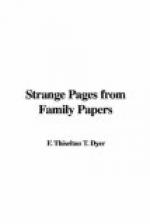Her story created much sympathy for her, and steps were immediately taken to punish those who had abducted her in this outrageous manner. The girl, who was in a very weak condition, was taken to the house she had specified, one “Mother” Wells, who kept an establishment of doubtful reputation at Enfield Wash, and on being asked to identify the woman who had cut off her stays, and locked her up in the room referred to, pointed out one Mary Squires, an old gipsy of surpassing ugliness. Accordingly, Squires and Wells were committed for trial for assault and felony; the result of the trial being that Squires was condemned to death, and Wells to be burned in the hand, a sentence which was executed forthwith, much to the delight of the excited crowd in the Old Bailey Sessions-house.
But the Lord Mayor, Sir Crisp Gascoyne, who had presided at the trial ex-officio, was not satisfied with the verdict, and caused further and searching inquiries to be made. The verdict, on the weight of fresh evidence obtained, was upset, and Squires was granted a free pardon. On 29th April, 1754, Elizabeth Canning was summoned again to the Old Bailey, but this time to take her trial for wilful and corrupt perjury. The trial lasted eight days, and, being found guilty, she was transported in August, “at the request of her friends, to New England.” According to the “Annual Register,” she returned to this country at the expiration of her sentence to receive a legacy of L500, left to her three years before by an old lady of Newington Green; whereas, later accounts affirm that she never came back, but died 22nd July, 1773, at Weathersfield, in Connecticut, it being further stated that she married abroad a Quaker of the name of Treat, “and for some time followed the occupation of a schoolmistress.”
The mystery of her life—her disappearance from Jan. 1st to the 29th of that month, and what transpired in that interval—is a secret that has never been to this day divulged. Indeed, as it has been observed, “notwithstanding the many strange circumstances of her story, none is so strange as that it should not be discovered in so many years where she had concealed herself during the time she had invariably declared she was at the house of Mother Wells."[48]
Another curious disappearance is recorded by Sir John Coleridge, forming a strange story of romance. It seems there lived in Cornwall, a highly respectable family, named Robinson, consisting of two sons—William and Nicholas—and two daughters. The property was settled on the two sons and their male issue, and in case of death on the two daughters. Nicholas was placed with an eminent attorney of St. Austen as his clerk, with a prospect of being one day admitted into partnership. But his legal studies were somewhat interrupted by his falling in love with a milliner’s apprentice; the result being that he was sent to London to qualify himself as an attorney. But he had no sooner been admitted an attorney of the Queen’s Bench and Common Pleas than he disappeared, and thenceforward he was never seen by any member of his family or former friends, all search for him proving fruitless.




